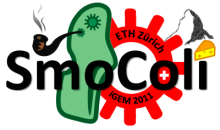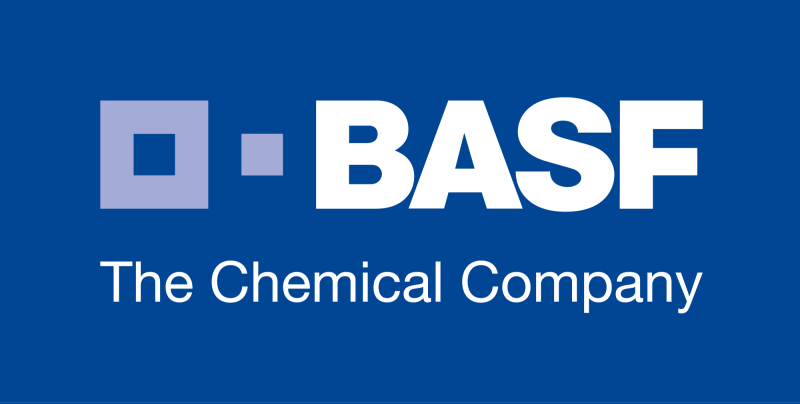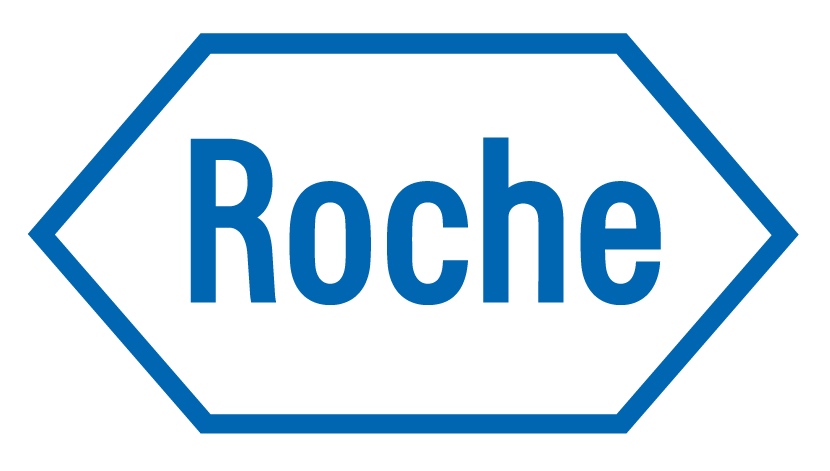Team:ETH Zurich/Achievements
From 2011.igem.org
(Difference between revisions)
(→Biology) |
(→Human Practices) |
||
| (21 intermediate revisions not shown) | |||
| Line 2: | Line 2: | ||
{{:Team:ETH Zurich/Templates/SectionStart}} | {{:Team:ETH Zurich/Templates/SectionStart}} | ||
| - | =SmoColi - Achievements = | + | = SmoColi - Achievements = |
| + | |||
| + | '''It has been a long four and a half months since we started working on our SmoColi project. During that time, we worked hard and learned a lot of new stuff. Below we summarize shortly what we did and what we have achieved so far. If you would like to read more about a particular achievement, click on the respective link.''' | ||
{{:Team:ETH Zurich/Templates/SectionEnd}} | {{:Team:ETH Zurich/Templates/SectionEnd}} | ||
| Line 10: | Line 12: | ||
=Modeling= | =Modeling= | ||
* We made a [[Team:ETH_Zurich/Modeling/Microfluidics|'''reaction-diffusion model''']] for the toxic molecule gradient formation in a channel and got a feeling about the feasibility of our ideas and channel dimensions. | * We made a [[Team:ETH_Zurich/Modeling/Microfluidics|'''reaction-diffusion model''']] for the toxic molecule gradient formation in a channel and got a feeling about the feasibility of our ideas and channel dimensions. | ||
| - | * We approximated the '''gradient analytically''' and checked that it | + | * We approximated the '''[[Team:ETH_Zurich/Modeling/Analytical_Approximation#Analytical_Solution|gradient analytically]]''' and checked that it coincides with the '''[[Team:ETH_Zurich/Modeling/Analytical_Approximation#Analytical_Solution|numerically]]''' obtained one. Additionally, we gave an [[Team:ETH_Zurich/Modeling/Analytical_Approximation#4._GFP_Band_Existence|'''analytical criterion for the existence of the GFP band''']]. |
* We made a [[Team:ETH_Zurich/Modeling/SingleCell|'''single cell model''']] describing our circuit and verified its operation. | * We made a [[Team:ETH_Zurich/Modeling/SingleCell|'''single cell model''']] describing our circuit and verified its operation. | ||
* We performed a [[Team:ETH_Zurich/Modeling/Analysis|'''robustness analysis''']] of our system to see how the band behaves upon parameter variations and concluded that it is robust and monostable. | * We performed a [[Team:ETH_Zurich/Modeling/Analysis|'''robustness analysis''']] of our system to see how the band behaves upon parameter variations and concluded that it is robust and monostable. | ||
* We performed [[Team:ETH_Zurich/Modeling/Stochastic|'''stochastic analysis''']] to see how the GFP band reacts upon noise and confirmed one more time its robustness | * We performed [[Team:ETH_Zurich/Modeling/Stochastic|'''stochastic analysis''']] to see how the GFP band reacts upon noise and confirmed one more time its robustness | ||
* We integrated the single cell model and the reaction-diffusion model in a [[Team:ETH_Zurich/Modeling/Combined|'''combined 3D spatiotemporal reaction-diffusion model''']], simulated for various channel dimensions to get a feeling how the GFP band will move and how the alarm is activated | * We integrated the single cell model and the reaction-diffusion model in a [[Team:ETH_Zurich/Modeling/Combined|'''combined 3D spatiotemporal reaction-diffusion model''']], simulated for various channel dimensions to get a feeling how the GFP band will move and how the alarm is activated | ||
| - | * We extracted some information about the channel dimensions from the model and [[Team:ETH Zurich/Process/Microfluidics|used this information in the actual channel design]]. | + | * We extracted some information about the channel dimensions from the model and [[Team:ETH Zurich/Process/Microfluidics|'''used this information in the actual channel design''']]. |
{{:Team:ETH Zurich/Templates/SectionEnd}} | {{:Team:ETH Zurich/Templates/SectionEnd}} | ||
| Line 24: | Line 26: | ||
* We improved the pSB6A1 Plasmid to standard 5: [http://partsregistry.org/Part:BBa_K625005 '''pSB6A5'''] | * We improved the pSB6A1 Plasmid to standard 5: [http://partsregistry.org/Part:BBa_K625005 '''pSB6A5'''] | ||
* We created the [http://partsregistry.org/Part:BBa_K625000 BioBrick '''LacI<sub>M1</sub>'''] which is a codon modified LacI for multiplasmid operations | * We created the [http://partsregistry.org/Part:BBa_K625000 BioBrick '''LacI<sub>M1</sub>'''] which is a codon modified LacI for multiplasmid operations | ||
| - | * We created [https://2011.igem.org/Team:ETH_Zurich/Biology/Validation#XylR_-_the_xylene_sensor two improved | + | * We created [https://2011.igem.org/Team:ETH_Zurich/Biology/Validation#XylR_-_the_xylene_sensor two improved versions of the '''P<sub>U</sub>''' BioBrick], characterized the P<sub>U</sub> promoter and fitted a dose response curve to the data |
| + | * We characterized the [[Team:ETH_Zurich/Biology/Validation#AraC_-_the_arabinose_sensor|'''P<sub>BAD</sub>''']] dose response for homogenous expression of the P<sub>BAD</sub> in BW27783 | ||
* We successfully tested the '''channel''' in terms of '''cell viability and GFP synthesis''' | * We successfully tested the '''channel''' in terms of '''cell viability and GFP synthesis''' | ||
| - | * We could | + | * We could establish a '''gradient of a small molecule''' (IPTG and arabinose) in a tube and also in the microfluidic channel |
| + | |||
{{:Team:ETH Zurich/Templates/SectionEnd}} | {{:Team:ETH Zurich/Templates/SectionEnd}} | ||
| Line 33: | Line 37: | ||
=Microfluidics= | =Microfluidics= | ||
* We [[Team:ETH_Zurich/Process/Validation|systematically came up with the current channel design]] through a [[Team:ETH_Zurich/Process/Microfluidics|process of developing and refining chain of ideas for different designs]]. | * We [[Team:ETH_Zurich/Process/Validation|systematically came up with the current channel design]] through a [[Team:ETH_Zurich/Process/Microfluidics|process of developing and refining chain of ideas for different designs]]. | ||
| - | * Modeling | + | * Modeling helped to improve the channel design |
* We participated in the [[Team:ETH_Zurich/Process/Validation#Final Channel Construction|PDMS channel construction]]. | * We participated in the [[Team:ETH_Zurich/Process/Validation#Final Channel Construction|PDMS channel construction]]. | ||
{{:Team:ETH Zurich/Templates/SectionEnd}} | {{:Team:ETH Zurich/Templates/SectionEnd}} | ||
| Line 44: | Line 48: | ||
* We also made a [[Team:ETH Zurich/Team/Human practices#Survey|'''survey''']] with critical questions related to Synthetic Biology and iGEM, asked people to fill it out and analyzed the results. | * We also made a [[Team:ETH Zurich/Team/Human practices#Survey|'''survey''']] with critical questions related to Synthetic Biology and iGEM, asked people to fill it out and analyzed the results. | ||
* '''ETH GLOBE''' and '''NZZ''' (Neue Zeitung Zürich) will write about our participation at iGEM World Championship Jamboree | * '''ETH GLOBE''' and '''NZZ''' (Neue Zeitung Zürich) will write about our participation at iGEM World Championship Jamboree | ||
| - | * We helped the [[Team:Edinburgh/Collaboration#Thanks_to_ETH_Zurich|'''Edinburgh 2011 iGEM team''']] with '''debugging their [[Team:Edinburgh/Cellulases_(MATLAB_model)|MATLAB cellulase model]]''' | + | {{:Team:ETH Zurich/Templates/SectionEnd}} |
| + | |||
| + | {{:Team:ETH Zurich/Templates/SectionStart}} | ||
| + | |||
| + | =Collaboration= | ||
| + | * We helped the [[Team:Edinburgh/Collaboration#Thanks_to_ETH_Zurich|'''Edinburgh 2011 iGEM team''']] with '''debugging their [[Team:Edinburgh/Cellulases_(MATLAB_model)|MATLAB cellulase model]]''' | ||
{{:Team:ETH Zurich/Templates/SectionEnd}} | {{:Team:ETH Zurich/Templates/SectionEnd}} | ||
Latest revision as of 03:16, 29 October 2011
SmoColi - Achievements
It has been a long four and a half months since we started working on our SmoColi project. During that time, we worked hard and learned a lot of new stuff. Below we summarize shortly what we did and what we have achieved so far. If you would like to read more about a particular achievement, click on the respective link.
Modeling
- We made a reaction-diffusion model for the toxic molecule gradient formation in a channel and got a feeling about the feasibility of our ideas and channel dimensions.
- We approximated the gradient analytically and checked that it coincides with the numerically obtained one. Additionally, we gave an analytical criterion for the existence of the GFP band.
- We made a single cell model describing our circuit and verified its operation.
- We performed a robustness analysis of our system to see how the band behaves upon parameter variations and concluded that it is robust and monostable.
- We performed stochastic analysis to see how the GFP band reacts upon noise and confirmed one more time its robustness
- We integrated the single cell model and the reaction-diffusion model in a combined 3D spatiotemporal reaction-diffusion model, simulated for various channel dimensions to get a feeling how the GFP band will move and how the alarm is activated
- We extracted some information about the channel dimensions from the model and used this information in the actual channel design.
Biology
- After severe cloning difficulties (due to unexpected lethality of active CI and LacI), the final system was completely established.
- We improved the pSB6A1 Plasmid to standard 5: [http://partsregistry.org/Part:BBa_K625005 pSB6A5]
- We created the [http://partsregistry.org/Part:BBa_K625000 BioBrick LacIM1] which is a codon modified LacI for multiplasmid operations
- We created two improved versions of the PU BioBrick, characterized the PU promoter and fitted a dose response curve to the data
- We characterized the PBAD dose response for homogenous expression of the PBAD in BW27783
- We successfully tested the channel in terms of cell viability and GFP synthesis
- We could establish a gradient of a small molecule (IPTG and arabinose) in a tube and also in the microfluidic channel
Microfluidics
- We systematically came up with the current channel design through a process of developing and refining chain of ideas for different designs.
- Modeling helped to improve the channel design
- We participated in the PDMS channel construction.
Human Practices
- We presented Synthetic Biology and iGEM to our fellow students in the CBB get together afternoon.
- We presented iGEM and our project to the general public on the BSSE Open House Day through a poster and a slide show.
- We also made a survey with critical questions related to Synthetic Biology and iGEM, asked people to fill it out and analyzed the results.
- ETH GLOBE and NZZ (Neue Zeitung Zürich) will write about our participation at iGEM World Championship Jamboree
Personal achievements
- xx managed to move the Dropbox folder to another location, thus making it look empty for the others.
- xx accidentally modified an other teams wiki for 1 min
- xx and xy slept the whole boat trip in Amsterdam
- xy found a mistake in the PowerPoint in the morning before the presentation ("And the channel turns read")
- xy managed to sleep at two chairs in the lab
- We had fun!
 "
"




